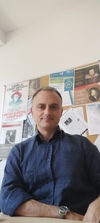Studying at the University of Verona
Here you can find information on the organisational aspects of the Programme, lecture timetables, learning activities and useful contact details for your time at the University, from enrolment to graduation.
Academic calendar
The academic calendar shows the deadlines and scheduled events that are relevant to students, teaching and technical-administrative staff of the University. Public holidays and University closures are also indicated. The academic year normally begins on 1 October each year and ends on 30 September of the following year.
Course calendar
The Academic Calendar sets out the degree programme lecture and exam timetables, as well as the relevant university closure dates..
| Period | From | To |
|---|---|---|
| I semestre (Lingue e letterature straniere) | Sep 26, 2022 | Dec 23, 2022 |
| II semestre (Lingue e letterature straniere) | Feb 13, 2023 | May 27, 2023 |
| Session | From | To |
|---|---|---|
| ESAMI LINGUE - sessione invernale | Jan 9, 2023 | Feb 11, 2023 |
| ESAMI LINGUE - sessione estiva | May 29, 2023 | Jul 22, 2023 |
| ESAMI LINGUE - sessione autunnale | Aug 28, 2023 | Sep 23, 2023 |
| Session | From | To |
|---|---|---|
| LAUREE LINGUE - sessione autunnale (a.a. 2021-2022) | Nov 7, 2022 | Nov 12, 2022 |
| LAUREE LINGUE - sessione straordinaria (a.a. 2021-2022) | Mar 31, 2023 | Apr 6, 2023 |
| LAUREE LINGUE - sessione estiva (a.a. 2022-2023) | Jul 10, 2023 | Jul 15, 2023 |
Exam calendar
Exam dates and rounds are managed by the relevant Foreign Languages and Literatures Teaching and Student Services Unit.
To view all the exam sessions available, please use the Exam dashboard on ESSE3.
If you forgot your login details or have problems logging in, please contact the relevant IT HelpDesk, or check the login details recovery web page.
Should you have any doubts or questions, please check the Enrollment FAQs
Academic staff
 beatrice.melodiafesta@univr.it
beatrice.melodiafesta@univr.it
 sara.paolini@univr.it
sara.paolini@univr.it
Study Plan
The Study Plan includes all modules, teaching and learning activities that each student will need to undertake during their time at the University.
Please select your Study Plan based on your enrollment year.
1° Year
| Modules | Credits | TAF | SSD |
|---|
1st foreign language2nd foreign language1st foreign literature2nd foreign literature1 module between the following2° Year activated in the A.Y. 2023/2024
| Modules | Credits | TAF | SSD |
|---|
1st foreign language2nd foreign language1st foreign literature2nd foreign literature3° Year It will be activated in the A.Y. 2024/2025
| Modules | Credits | TAF | SSD |
|---|
1st foreign language1st foreign literature2nd foreign language2nd foreign literature1 module among the following (philology related to 1st or 2nd foreign language)1 module between the following| Modules | Credits | TAF | SSD |
|---|
1st foreign language2nd foreign language1st foreign literature2nd foreign literature1 module between the following| Modules | Credits | TAF | SSD |
|---|
1st foreign language2nd foreign language1st foreign literature2nd foreign literature| Modules | Credits | TAF | SSD |
|---|
1st foreign language1st foreign literature2nd foreign language2nd foreign literature1 module among the following (philology related to 1st or 2nd foreign language)1 module between the following| Modules | Credits | TAF | SSD |
|---|
Legend | Type of training activity (TTA)
TAF (Type of Educational Activity) All courses and activities are classified into different types of educational activities, indicated by a letter.
German literature 2 (2023/2024)
Teaching code
4S002930
Academic staff
Coordinator
Credits
9
Language
German
Scientific Disciplinary Sector (SSD)
L-LIN/13 - GERMAN LITERATURE
Period
I semestre (Lingue e letterature straniere) dal Sep 25, 2023 al Dec 22, 2023.
Courses Single
Authorized
Learning objectives
The course aims at introducing the students to the most important periods and trends of German 19th Century literature: Classic and Romantic literature, “Vormärz”, “Biedermeier”, Realism. At the end of the course students will possess a thourough knowledege of the topics we dealt with during the lessons, with both regard to historical and aesthetic aspects of the texts. Moreover they will be able to read and analyse the texts in German and explain their knowledge in proper German speech.
Prerequisites and basic notions
To attend the course, the following prerequisites are required:
- Level B1 in German
- mastering the main foundations of textual analysis
- basic knowledge of the history of 19th century European culture
Program
During the course we will analyse literary works by some of the major representatives of 19th-century German literature.
The following texts will be analysed during the lessons:
H. v. Kleist, Penthesilea
E. T. A. Hoffmann, Der Sandmann
H. Heine, Die Harzreise + selected poems
G. Büchner, Woyzeck
A. v. Droste Hülshoff, Die Judenbuche
G. Keller, Romeo und Julia auf dem Dorfe
T. Fontane, Effi Briest
Extracts from the texts to be read, translated and commented on during the lessons will be available for download on moodle. Students are required to read the texts completely for the exam.
Students will then have to choose one of the following texts to read and prepare autonomously for the exam:
H. von Kleist: Penthesilea
J. von Eichendorff: Aus dem Leben eines Taugenichts
E.T.A. Hoffmann: Meister Floh
G. Büchner: Lenz
A. Stifter: Bergkristall
T. Storm: Immensee
G. Keller: Kleider machen Leute
For a general study of the historical-literary period in question, please refer to the following textbook:
W. Beutin et al., Deutsche Literaturgeschichte. Von den Anfängen bis zur Gegenwart, 8. Auflage, Stuttgart, Metzler, 2013.
Non-attending students are required to choose 2 readings, instead of one, from the reading list to prepare for the exam autonomously, and a critical essay on one of the texts in the programme to be approved by the lecturer.
Bibliography
Didactic methods
The main teaching modality is frontal teaching. During the lessons, however, students will engage in short exercises in reading, comprehension and commentary on the texts.
Those who are unable to attend the course, or are made to miss classes, may contact the lecturer to agree on catch-up arrangements.
Learning assessment procedures
The final exam will be oral, held in German, and will cover the entire course programme.
ERASMUS students should please contact the teacher at the beginning of the course to agree upon the exam modality.
Evaluation criteria
The exam will consist in a conversation aimed at testing:
- depth and wideness of the acquired knowledge
- the ability of critical reflection and analysis of the texts
- the ability to contextualize texts from a historical and cultural point of view
- the ability to handle contents in German
Criteria for the composition of the final grade
The final mark will be in 30ths.
Exam language
Tedesco / German
Type D and Type F activities
Nei piani didattici di ciascun Corso di studio è previsto l’obbligo di conseguire un certo numero di CFU di tipologia D e di tipologia F.
CFU D (attività a scelta dello studente)
I CFU D possono essere acquisiti mediante:
- insegnamenti non obbligatori nel proprio piano didattico (previa approvazione del Presidente del Collegio didattico per insegnamenti non selezionabili in autonomia)
- attività accreditate dal Collegio didattico
- competenze linguistiche (diverse o ulteriori) rispetto a quelle obbligatorie
- tirocini o stage
- TALC (competenze trasversali).
Competenze trasversali TALC
Nota bene: i corsi TALC sono riconosciuti solo come CFU D.
Il numero di CFU D va calcolato complessivamente sull’intero triennio/biennio e non è legato all'annualità.
CFU F
I CFU F sono solitamente relativi ad abilità informatiche, competenze linguistiche, stage e tirocini e ulteriori attività formative accreditate in questa tipologia dal Collegio Didattico.
Nel corso di laurea in Lingue e Letterature Straniere sono previste le seguenti tipologie:
- 3 CFU per terza lingua (livello B1)
- 3 CFU per informatica.
Le competenze informatiche possono essere acquisite attraverso:
- il superamento della prova pratica presso le aule informatiche di Ateneo,
- la frequenza dei corsi attivati da scuole e centri accreditati dall’AICA (Associazione Italiana per l’Informatica e il Calcolo Automatico) o riconosciuti dalla Provincia e dalla Regione e superamento della relativa prova finale. Le domande per il riconoscimento delle competenze informatiche acquisite precedentemente vengono esaminate dalla Commissione per il riconoscimento delle Competenze Informatiche.
Lo studente ha comunque la possibilità di effettuare esperienze di stage e tirocini che però vengono riconosciuti all’interno dei crediti a scelta libera (CFU D).
To discover all the teaching activities accredited by the foreign teaching college click here
Career prospects
Module/Programme news
News for students
There you will find information, resources and services useful during your time at the University (Student’s exam record, your study plan on ESSE3, Distance Learning courses, university email account, office forms, administrative procedures, etc.). You can log into MyUnivr with your GIA login details: only in this way will you be able to receive notification of all the notices from your teachers and your secretariat via email and also via the Univr app.
Student login and resources
Gestione carriere
Assegnazione tutore
Attività accreditate D/F
Calendario didattico dettagliato
Cambio lingua curriculare
Competenze informatiche
Competenze linguistiche (prima e seconda lingua)
Competenze linguistiche in triennale (terza lingua CFU F)
Compilazione del piano didattico
Corso di Lingua portoghese
Erasmus+ e altre esperienze all'estero
Linguistic training CLA
Presentazione dei corsi di studio e Open day
Graduation
Saperi minimi
Stage e tirocini
Le attività di stage sono finalizzate a far acquisire allo studente una conoscenza diretta in settori di particolare interesse per l’inserimento nel mondo del lavoro e per l’acquisizione di abilità professionali specifiche.
Le attività di stage sono svolte sotto la diretta responsabilità di un singolo docente presso studi professionali, enti della pubblica amministrazione, aziende accreditate dall’Ateneo veronese.
I crediti maturati in seguito ad attività di stage saranno attribuiti secondo quanto disposto nel dettaglio dal “Regolamento d’Ateneo per il riconoscimento dei crediti maturati negli stage universitari” vigente.
- Tutte le informazioni in merito agli stage per futuri studenti sono disponibili alla pagina Stage e tirocini.
- Tutte le informazioni in merito agli stage per studenti iscritti sono pubblicate in MyUnivr - come fare per - stage e tirocini.
- Tutte le informazioni in merito agli stage per le aziende sono disponili alla pagina Stage e tirocini per azienze.
Ulteriori informazioni al seguente link https://www.univr.it/it/i-nostri-servizi/gestione-carriere-studenti-lingue-e-letterature-straniere/stage-e-tirocini-lingue-e-letterature-straniere

 +39 045802 8409
+39 045802 8409















































